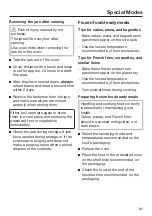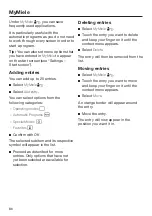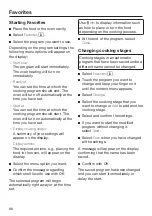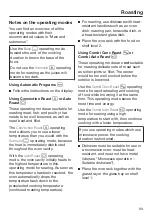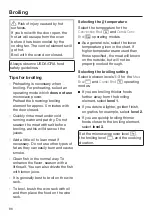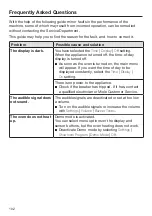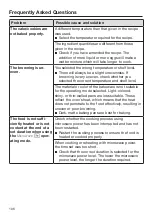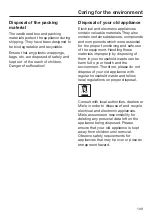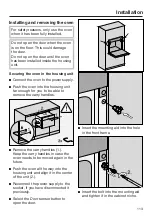
Cleaning and care of the oven
98
Danger of injury caused by hot
surfaces.
The oven gets hot during operation.
You could burn yourself on the
heater elements, oven cavity, or
accessories.
Allow the heater elements, oven
cavity, and accessories to cool
before manual cleaning.
Risk of injury due to electric
shock.
The steam from a steam cleaning
appliance could reach live electrical
components and cause a short
circuit.
Never use a steam cleaner for
cleaning.
All surfaces could be discolored or
damaged if unsuitable cleaning
agents are used. The oven front is
particularly susceptible to damage
from oven cleaners.
All surfaces are susceptible to
scratching. Scratches on glass can
lead to breakage in some
circumstances.
Remove all cleaning agent residues
immediately.
Stubborn soiling may damage the
oven.
Once the oven has cooled, clean the
oven cavity, the inside of the door,
and the door seal. Waiting too long
to clean the oven will make it much
more difficult to clean.
Operating a damaged oven can
result in microwave leakage and
present a hazard to the user.
Check the door and door seal for any
sign of damage. If any damage is
seen, the oven should not be used
again. Contact Miele.
Unsuitable cleaning agents
To avoid damaging the surfaces of your
appliance, do not use:
- cleaning agents containing soda,
ammonia, acids, or chlorides
- cleaning agents containing descaling
agents on the front
- abrasive cleaning agents
(e.g., powder cleaners and cream
cleaners)
- solvent-based cleaning agents
- stainless steel cleaning agents
- dishwasher cleaners
- glass cleaners
- cleaning agents for ceramic glass
cooktops
- hard, abrasive brushes or sponges
(e.g., pot scourers, brushes, or
sponges which have been previously
used with abrasive cleaning agents)
- eraser sponges
- sharp metal scrapers
- steel wool
- spot cleaning with mechanical
cleaning agents
- stainless steel spiral pads


